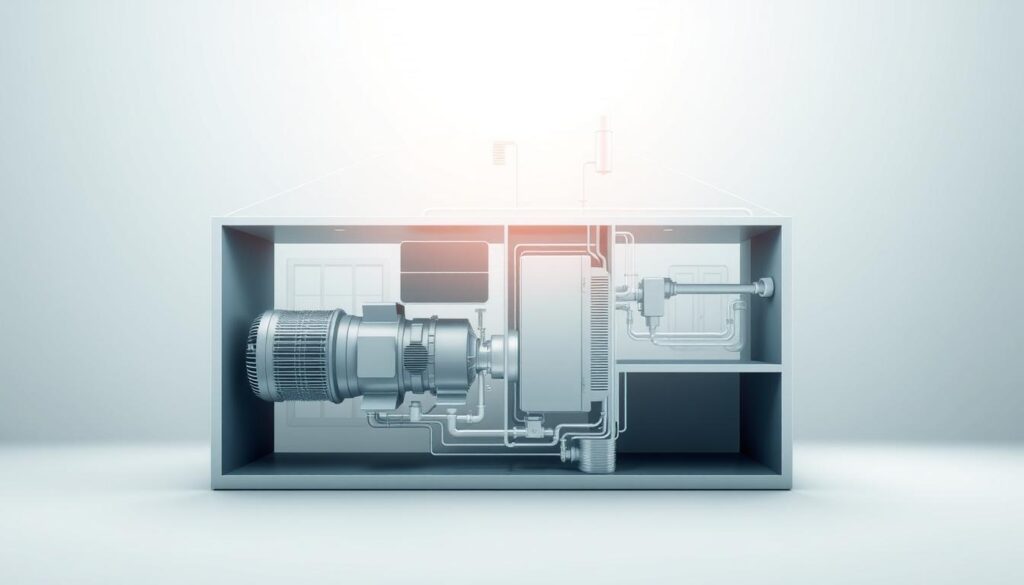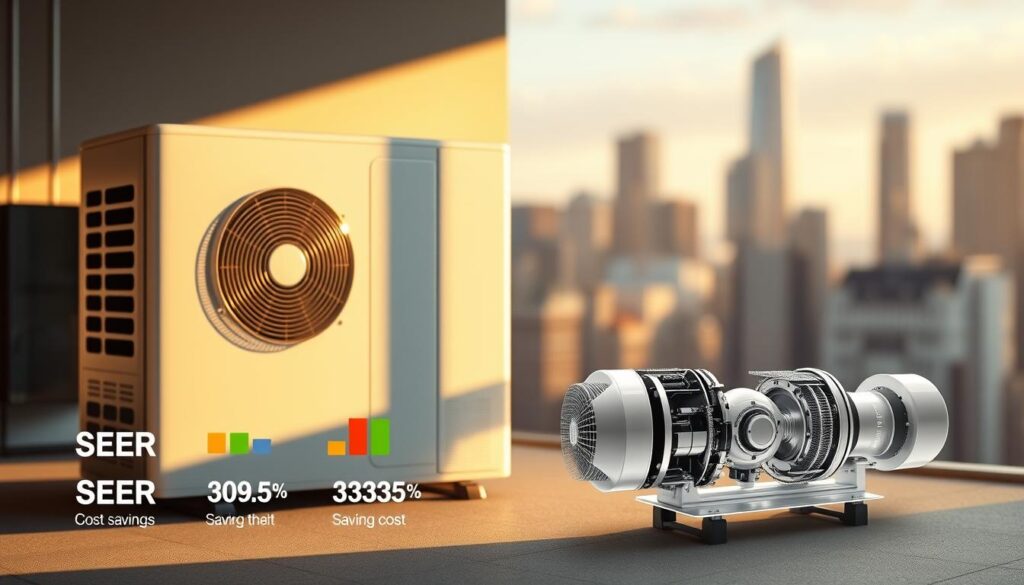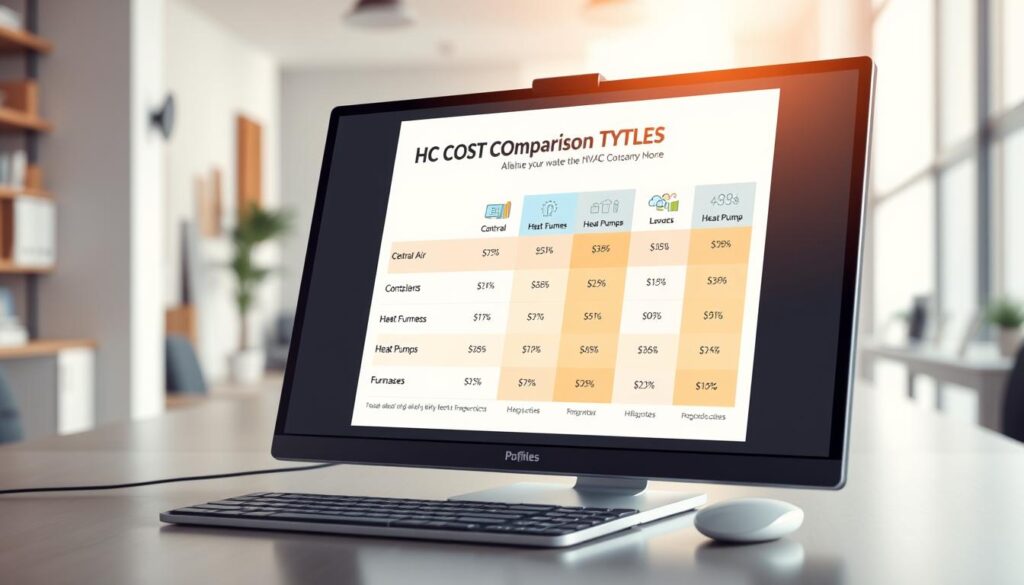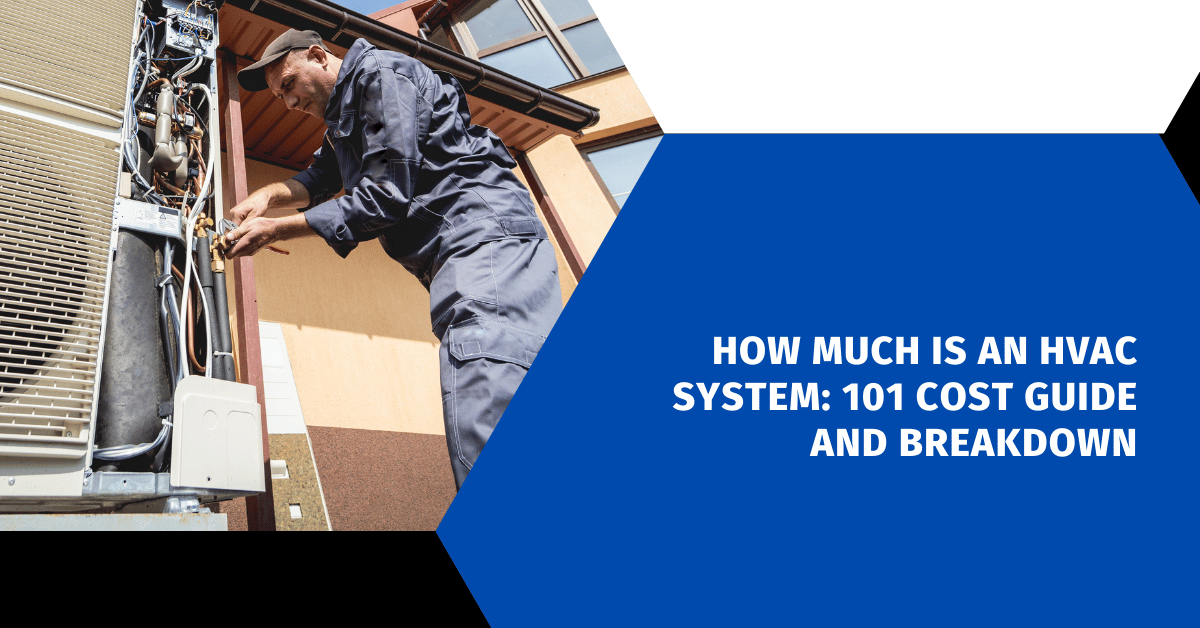Affiliate Disclosure
HVAC Guide Guys is a participant in the Amazon Services LLC Associates Program, an affiliate advertising program designed to provide a means for sites to earn advertising fees by advertising and linking to Amazon.
How Much Is an HVAC System? Ever thought about the cost of keeping your home comfy all year? Knowing the cost of an HVAC system can change the game for homeowners planning their comfort investments.

The national average for an HVAC system is about $7,500. But prices can change a lot. Your home’s needs, the system’s complexity, and energy efficiency all play a part in the final cost.
An HVAC system is more than a buy—it’s an investment in your home’s comfort, air quality, and energy use. Whether it’s a new system or a replacement, knowing the costs helps you make smart choices.
Key Takeaways
- Average HVAC system cost ranges from $5,000 to $12,500
- Prices vary based on home size and system complexity
- Energy efficiency significantly impacts overall system cost
- Professional installation is key for best performance
- Think about long-term savings when looking at upfront costs
Table of Contents
Understanding HVAC Systems and Their Components
When you think about the cost of an HVAC installation, it’s important to know what you’re getting. An HVAC system is not just one unit. It’s a complex network of parts that work together to control temperature, humidity, and air quality.
Modern HVAC systems have several key parts that affect your hvac unit price and comfort:
- Heating unit (furnace or heat pump)
- Cooling unit (air conditioner)
- Air distribution system (ductwork)
- Thermostat and control mechanisms
What Makes Up a Complete HVAC System
A complete HVAC system has many parts working together. The heating unit, like a furnace or heat pump, keeps you warm in winter. The cooling unit, usually an air conditioner, cools and dehumidifies your home in summer.
Different Types of HVAC Units Available
There are many HVAC units for different homes and budgets. You can choose from:
- Central air conditioning systems
- Ductless mini-split systems
- Heat pumps
- Packaged HVAC units
The Role of Ductwork in HVAC Systems
Ductwork is a key part of your HVAC system. It carries heated or cooled air around your home. Good ductwork design can save energy and make your system work better.
Choosing the right HVAC system involves carefully considering your home’s specific needs and budget constraints.
Explore Our HVAC Shop
Looking for top-rated HVAC tools, parts, and accessories? Visit our shop and find the perfect solution for your needs.
Visit the ShopAverage HVAC System Installation Costs
Knowing how much an HVAC system costs is key for homeowners looking to replace theirs. The cost can change a lot based on different things. Installing a new HVAC system needs careful planning and looking at several important costs.
Recent data shows the average cost for a new HVAC system is between $5,000 and $11,000. Your exact cost will depend on a few main things:
- Home square footage
- System complexity
- Regional labor rates
- Equipment efficiency ratings
National Cost Averages for Installation
When planning your HVAC replacement budget, keep these price ranges in mind:
- Basic systems: $3,000 – $6,000
- Mid-range systems: $6,000 – $10,000
- High-end systems: $10,000 – $16,000
Labor Costs vs Equipment Costs
Looking at your total cost, you’ll see a split between labor and equipment. Labor usually makes up 30-40% of the cost. The HVAC equipment makes up 60-70% of your total cost.
Additional Installation Expenses
Be ready for extra costs like:
- Permit fees
- Ductwork modifications
- Electrical system upgrades
- Removal of old equipment
Pro tip: Always get multiple quotes and understand the full scope of your HVAC installation to avoid unexpected expenses.
How Much Is an HVAC System Based on Home Size
When figuring out the cost of an HVAC system for your home, size matters a lot. The cost of residential HVAC systems changes a lot based on your home’s size and needs.
For homes around 1,000 square feet, expect to spend between $3,000 and $6,000 for a full HVAC system. Homes that are 3,000 square feet or more might cost between $9,000 and $18,000.
- 1,000 sq ft home: $3,000 – $6,000
- 1,500 sq ft home: $4,500 – $8,500
- 2,000 sq ft home: $6,000 – $12,000
- 3,000 sq ft home: $9,000 – $18,000
Several important factors affect the cost of residential HVAC systems, not just the size:
- Home layout and insulation
- Local climate conditions
- Number of windows and doors
- Ceiling height
- Existing ductwork infrastructure
Professional HVAC contractors suggest getting a detailed home assessment. This helps figure out the right system size and capacity for your home.
Explore Our HVAC Shop
Looking for top-rated HVAC tools, parts, and accessories? Visit our shop and find the perfect solution for your needs.
Visit the ShopHVAC Brands and Their Price Ranges
When looking at hvac system pricing, knowing the different manufacturers is key. The HVAC market has many brands for various budgets and needs.
Choosing hvac equipment means looking at brand reputation, performance, and value. Not every system is the same. Your home’s needs will guide your choice.
Premium vs Budget Brand Comparison
HVAC brands fall into two main groups:
- Premium Brands: Carrier, Trane, and Lennox
- Higher initial investment
- Advanced technology
- Superior energy efficiency
- Budget Brands: Goodman, Rheem, and Armstrong
- Lower upfront costs
- Solid performance
- More affordable maintenance
Most Popular HVAC Manufacturers
In the United States, top HVAC makers offer quality systems at different prices:
- Carrier – Known for innovation
- Lennox – High energy efficiency
- Trane – Robust and reliable
- Goodman – Budget-friendly option
Warranty Coverage by Brand
Warranty terms are important for your long-term investment. Most premium brands offer:
“A good warranty is like insurance for your HVAC system.” – HVAC Industry Expert
Warranties usually last 5 to 10 years. Some premium brands even offer longer protection. Always check the warranty details before buying.
Cost Factors for HVAC Installation
Knowing what affects hvac installation cost helps you plan better for your home’s comfort system. The total cost of your hvac system depends on several factors. These factors can greatly change the final price.
Several key elements determine the overall expense of your HVAC installation:
- Home size and square footage
- Specific system type and complexity
- Energy efficiency ratings
- Local labor rates
- Existing ductwork condition
The size of your home is a big factor in hvac system cost. Bigger homes need more powerful systems, which means higher installation costs. A 1,500 square foot home will have different requirements compared to a 3,500 square foot residence.
Local market conditions also play a big role in installation prices. Labor rates vary by region. Urban areas usually charge more than rural areas for HVAC installation. Technicians look at your home’s details to suggest the best system for you.
Energy efficiency can also affect your initial cost. High-efficiency systems might cost more at first but save you money in the long run. When planning your HVAC installation, think about the balance between the initial cost and future savings.
Pro tip: Always get multiple quotes and ask detailed questions about the factors affecting your specific HVAC installation cost.
Explore Our HVAC Shop
Looking for top-rated HVAC tools, parts, and accessories? Visit our shop and find the perfect solution for your needs.
Visit the ShopEnergy Efficiency and SEER Ratings Impact on Cost
When you’re looking for an HVAC system, knowing about energy efficiency can save you a lot of money. The Seasonal Energy Efficiency Ratio (SEER) rating is key. It helps you choose the right HVAC system for your home.

Understanding SEER2 Ratings
SEER2 is the new standard for measuring HVAC efficiency. The higher the SEER2 rating, the better the energy use. Ratings go from 13 to 26, with higher numbers meaning better performance.
- 13-14 SEER2: Minimum efficiency standard
- 15-16 SEER2: Good energy performance
- 17-18 SEER2: High efficiency
- 19-26 SEER2: Premium efficiency
Long-term Savings with Higher SEER Ratings
Choosing a high-efficiency HVAC system can save you a lot of money over time. The upfront cost might be more, but you’ll save on your monthly bills.
| SEER2 Rating | Annual Energy Cost | Estimated Savings |
|---|---|---|
| 14 SEER2 | $850 | Baseline |
| 18 SEER2 | $650 | $200 per year |
| 22 SEER2 | $500 | $350 per year |
Cost Differences Between Efficiency Levels
The cost difference between standard and high-efficiency HVAC systems can be $1,000 to $3,000. Your savings depend on your climate, usage, and local energy rates. Consult with a professional to find the best option for your home.
Ductwork Installation and Replacement Costs
Ductwork is key in HVAC systems, but often overlooked by homeowners. It’s the air circulation system in your home, spreading heat and cool air everywhere.
The cost of ductwork for your HVAC system is a big part of the total cost. Installing ductwork can cost between $10 and $20 per foot. This price depends on a few things:
- Home size
- Home layout complexity
- Duct material quality
- How easy it is to install
Experts say to check your ductwork before installing new systems. Old or damaged ducts can cut system efficiency by up to 30%. Replacing them is a wise choice for the future.
| Ductwork Type | Cost per Linear Foot | Best Suited For |
|---|---|---|
| Flexible Ductwork | $1 – $4 | Tight spaces, easy installation |
| Sheet Metal Ducts | $5 – $15 | Durability, long-term performance |
| Fiberglass Lined Ducts | $7 – $20 | Noise reduction, improved insulation |
When planning your HVAC costs, remember quality ductwork matters. It improves air quality, cuts energy bills, and boosts system performance.
Explore Our HVAC Shop
Looking for top-rated HVAC tools, parts, and accessories? Visit our shop and find the perfect solution for your needs.
Visit the ShopCost Comparison of Different HVAC Types
When looking at residential hvac cost, knowing the different systems helps you choose wisely. Each system has its own benefits and prices, affecting your total cost.

Choosing the right HVAC system depends on several things. These include your home’s size, the local climate, and your budget. Here’s a look at the costs for different HVAC options:
Central AC and Furnace Systems
Central AC and furnace combos are the classic choice for heating and cooling. Prices vary from $6,000 to $12,000, based on your home’s size and the system’s complexity.
- Best for larger homes with existing ductwork
- Provides consistent temperature control
- Higher upfront installation costs
Heat Pump Systems
Heat pumps do both heating and cooling in one unit. Residential hvac cost for heat pumps is usually between $4,500 and $8,000. They’re a cost-effective choice.
- Energy-efficient alternative
- Works well in moderate climates
- Lower operational expenses
Ductless Mini-Split Systems
Ductless mini-split systems offer flexible cooling and heating. Prices for these systems range from $3,000 to $7,000. They’re perfect for smaller spaces or homes without ductwork.
- Easy installation
- Individual room temperature control
- Great for additions or renovated spaces
Additional HVAC Components and Add-ons
Adding more to your HVAC system can make your home more comfortable and clean. These extras can be worth the cost when you think about how they improve your space.
There are several important add-ons that can boost your HVAC system’s performance:
- Air Purifiers: Get rid of allergens, dust, and pollutants in your air
- Smart Thermostats: Help control the temperature and save on energy
- Dehumidifiers: Cut down on moisture for better comfort
- UV Lamps: Kill harmful bacteria and clean the air
Adding these extras will cost more, but they’re often worth it. Here’s a look at the costs and benefits:
| Component | Average Cost | Key Benefits |
|---|---|---|
| Air Purifier | $400 – $1,500 | Removes airborne contaminants |
| Smart Thermostat | $200 – $500 | Energy efficiency and remote control |
| Whole-Home Dehumidifier | $700 – $1,300 | Reduces humidity and prevents mold |
| UV Lamp | $100 – $300 | Kills bacteria and improves air quality |
Before buying these extras, talk to an HVAC expert. They can figure out what you need and suggest the best options for your home.
Explore Our HVAC Shop
Looking for top-rated HVAC tools, parts, and accessories? Visit our shop and find the perfect solution for your needs.
Visit the ShopWays to Save on HVAC Installation
Lowering your HVAC system cost is easier than you think. Smart homeowners can use several strategies to cut down on installation costs without sacrificing quality. Learning these tips can help you make a wise financial choice.
Tax Credits and Rebates
The government and many states give big incentives for energy-saving HVAC upgrades. These incentives can greatly lower what you pay:
- Federal tax credits up to $500 for energy-efficient systems
- State rebates from $50 to $500
- Utility company incentives
Seasonal Installation Discounts
Choosing the right time for your HVAC installation can save you money. Here are some smart strategies:
- Install during off-peak seasons for lower rates
- Winter and early spring have cheaper labor
- Discounts are common during slow months
Financing Options
| Financing Method | Interest Rates | Typical Term |
|---|---|---|
| Home Equity Loan | 4-7% | 5-15 years |
| Personal Loan | 6-12% | 2-7 years |
| HVAC Company Plan | 0-9% | 1-5 years |
Each financing option has its own benefits. Compare terms and total costs before choosing. Some HVAC companies offer zero-interest financing for certain customers. This can be a great way to manage your HVAC costs.
Conclusion
Exploring the cost of an HVAC system shows prices range from $5,000 to $12,500. This depends on your home size, energy needs, and system type. Smart homeowners see the upfront cost as just part of the story.
Commercial HVAC costs are different, needing more complex systems for bigger spaces. Whether upgrading your home or business, look into different brands and SEER ratings. Also, think about long-term energy savings.
Getting quotes from certified techs and checking for tax credits and rebates can help. Seasonal discounts can also save you money. Aim for a balance between initial costs and long-term energy savings.
Choosing the right HVAC system is a smart home improvement. It boosts comfort and might even raise your property value. Plan well and research thoroughly to find the best system for your needs and budget.

